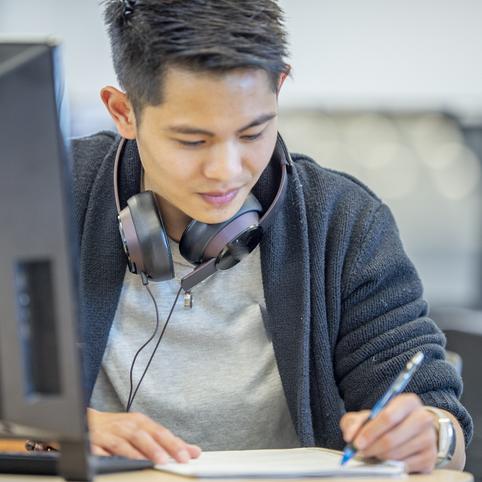
Digital Education
AI as a New Study Aid
College Students Embrace AI as Study Tool, Second Check, Proofreader
Once Modern Fantasy Literature is in session, an oval shape of chairs is formed, inviting shared inquiry and discourse among students and their professor Frank Cioffi. Yet what doesn’t get an invitation to class are their technological devices.
Professor Cioffi, an English professor at Baruch College in New York, teaches his course following a strict no-technology rule, cultivating a device-free zone where all exams and essays are done in class, in person with pen and paper.
Throughout the class, students’ phones are parked in their designated slots in the front of the room, while their laptops and tablets remain stowed away in their bags.
Professor Cioffi adopted this form of instruction after his experience in teaching a 3000-level English course, “Crafting Stronger Sentences: Conventions of English Grammar.” He noticed that his students would rely on artificial intelligence (AI) programs such as chat generative pre-trained transformer, known more informally as ChatGPT, to complete their extra credit assignments, defeating the purpose of a course designed to improve their grammatical writing abilities.
“I’m trying to get students to come up with their own ideas, organize them, and write them and present them to me in a fairly standard format,” Cioffi said in a recent interview. “ChatGPT can do that for them, but it doesn’t mean they know how to do it.”
Developed by AI research company Open AI, ChatGPT is an AI program designed to generate human-like text responses to user prompts by utilizing internet databases to produce informative responses across a wide range of topics.
Ever since its launch in November 2022, ChatGPT has quickly become a popular tool, gaining traction from one million users five days after its launch and with 100 million users as of November 2023.
Despite his zero-technology approach to his classroom, Professor Cioffi recognizes how AI programs such as ChatGPT can be beneficial and serve as a tool for students.
“You can use it as kind of an assistant, rather than a ghostwriter…look at the areas of your paper that ChatGPT [modifies] and ask yourself, ‘Why did it change that?’ And then go look at it and evaluate it” he said.
Schools and colleges wrestle with new AI tools and rules
ChatGPT was initially banned by the New York City Department of Education in January 2023, but that ban was reversed four months later in May. With AI programs newly available on school devices and networks, teachers were encouraged to incorporate generative AI tools to facilitate both their own teaching and their students’ learning.
In his blog post on JewishLink, director of technology at SAR High School in New York, Rabbi Avi Bloom noted the importance of staying “steadfastly attuned to the evolution of these tools and finding ways to work them into our curricula and our assignments.” Bloom emphasized that the education system needs to reevaluate the assignments and writing given to students and how they are graded.
“The whole notion of education is going to be reimagined,” said Lee Rainie, director of Elon University's Imagining the Digital Future center, at the “AI in Academia” webinar on March 8. The discussion hosted by the North Carolina university was centered around the intersection and implications of AI and its role in higher education.
Rainie shared the findings of the Center’s report on AI’s impact in 2040. “We will want to have artificial intelligence systems helping us acquire both insight and knowledge into the world” he said. “I think there's a real opportunity to build, you know, learning communities in new ways.”
AI as a learning tool
Laeticia Halbedel (laeticiahh) posted a video on TikTok claiming she could “study for four days and a half and still fail,” until she developed new study habits. Halbedel, a second-year life sciences major at the University of Toronto in Canada, utilizes ChatGPT to quiz herself in preparation for exams.
Halbedel shared her unique approach to studying by using AI. She explained that she pastes her notes as a prompt into ChatGPT and asks the program to write 20 multiple-choice questions that she practices until she can successfully answer all questions correctly.
“Then because I know the material so well, I’ll be like, this is wrong, and [ChatGPT will] be like 'Oh, sorry for the confusion, you are right.’ Once you can actually correct ChatGPT on the knowledge-based questions … you know you actually acquired the material” said Halbedel.
Julissa Perez, a junior at Baruch College, also uses ChatGPT for studying purposes, but additionally uses the program as a search engine and grammar tool, replacing her use of Google and Grammarly.
“I don’t even use Google that much anymore, I ask ChatGPT… In whatever format I’m asking the question or want the answer, ChatGPT will do it” said the arts administration major.
Perez shared that a big part of her major is creativity, so using AI programs is her attempt to refine her brainstorming and writing, as opposed to using it as a replacement for original thought. Aside from her duties as a student, Perez is head of the operations department at Baruch College’s radio station, WBMB, where AI is especially useful to her.
“I ask [ChatGPT] if there’s anything else that’s not included in this that could be useful for this event. Like ‘Did I forget to plan a set-up time in my itinerary?’”
As head of operations, she is in charge of scheduling DJ bookings when school clubs request a DJ at their events, along with handling necessary equipment and ensuring everything that is needed is successfully transported to said classroom or event space.
“Within limitations, AI is great, and I know we’re all just trying to get through college. But let’s not depend on it too much because we will have careers in the future,” said Perez.
Ilsa Lareb, a computer information systems (CIS) senior on the cybersecurity track, said that her professors at Baruch encourage the use of AI programs to run their codes in, as long as it prepares their ability to be on their own during proctored exams.
“In the future, let’s just say there’s a network outage … and we have to rely on human intelligence. But we were brought up sort of dependent on that, and what will happen in real-life scenarios?”
Lareb understands how the implications of AI can affect students and their abilities to be independent of these programs, but thinks AI can be a great tool if used in the right amount. She uses AI programs for her CIS-related classes; for classes of other subjects, she prefers her own notes and study guides.
Aside from ChatGPT, Lareb uses a large language model meta AI (Llama) to check and modify her codes by writing intricate prompts so the program understands her exact request with her coding.
Created and released in March 2023 by Meta, Llama is an AI program similar to ChatGPT, built to understand and generate human-like text, with the goal of “powering innovation through access,” according to the program’s website.
“Therefore [it uses] an engine like ChatGPT to expedite the process, just to create the structure and create the building blocks for you to then put your expertise to work,” said Gaurav Prasathong, a junior at Baruch College.
Prasathong is an international student majoring in CIS on the general track who utilizes AI as an assistant in both his major-related and non-major-related classes.
Through navigating online classes, he uses AI programs such as Tactiq and Otter to assist with note-taking, allowing him to focus on retaining information from the meetings. As a self-proclaimed “messy” coder, Prasathong checks his codes for bugs through ChatGPT and uses the program to simplify jargon and readings in his law and policy classes.
Prasathong encourages AI usage so that students can explore the possibilities and its intersection with human intelligence and capabilities. “At the end of the day, it's still a human who’s made it,” he said, “There’s no reason to not use it because you’re scared of its capabilities, in fact, you should use it to the best of its capabilities.”




